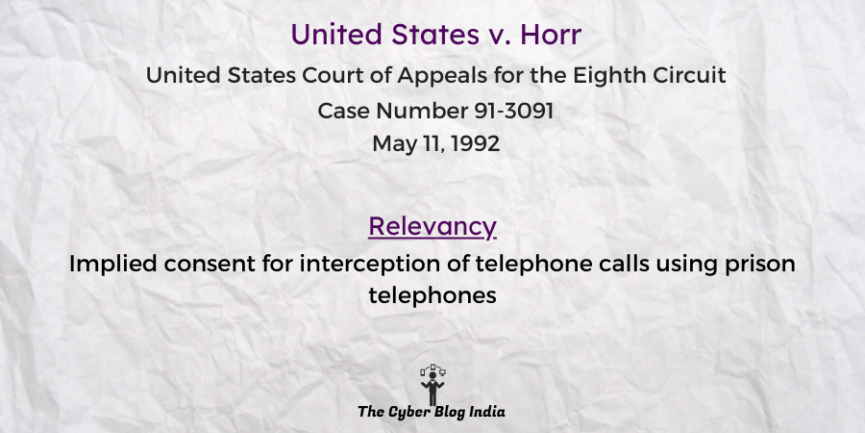United States v. Horr

United States v. Horr
963 F.2d 1124
In the United States Court of Appeals for the Eighth Circuit
Case Number 91-3091
Before Chief Judge Arnold, Senior Circuit Judge Heaney, and Circuit Judge Magill
Decided on May 11, 1992
Relevancy of the case: Implied consent for interception of telephone calls using prison telephones
Statutes and Provisions Involved
- 18 USC §§ 371, 751(a), 1791 (a)(2)
Relevant Facts of the Case
- Horr, along with Archer and Goldstein, planned to escape from the Federal Medical Center (FMC) by using a gun and taking hostages.
- Arden reported the escape plan to the Federal Bureau of Investigation (FBI) without the knowledge of the accomplices.
- Telephone conversations about buying guns in shaving kits and throwing them over the FMC fence were recorded as part of the Bureau of Prisons’ policy.
- Goldstein and Archer retrieved the kit, with Goldstein hiding it in his shirt. At that moment, the agents apprehended both Goldstein and Horr.
Prominent Arguments by the Counsels
- The appellant’s counsel claims that the District Court rejected his motion to suppress the recordings of his telephone conversations. The counsel for the appellant argues that none of the exceptions to the warrant requirement under Title III applied to the Bureau of Prisons’ recording of his conversations. Further, the counsel submits that he did not consent to the taping because he had no choice concerning whether he wanted to have his calls monitored.
Opinion of the Bench
- The appellant was aware of the telephone monitoring policy. It was his choice to use the telephone to conduct his illegal business.
- Having gambled by discussing his escape on the prison telephone, the appellant cannot now be heard to complain that he lost.
Final Decision
- The court affirmed the appellant’s conviction.
Aditi Sharma, an undergraduate student at NMIMS School of Law, Indore, prepared this case summary during her internship with The Cyber Blog India in May/June 2023.
